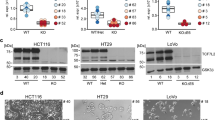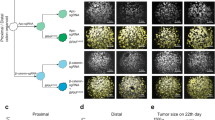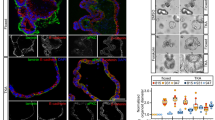Abstract
The gravity of colorectal cancer is mainly due to the capacity of tumor cells to migrate out of the tumor mass to invade the stroma and disseminate as metastases. The acquisition of a migratory phenotype also occurs during wound healing. Here, we show that several features characterizing invasive colon tumor cells are shared by migrating cells during wound repair in vitro. In particular, the expression of the intestine-specific transcription factor Cdx2, a key gene for intestinal identity downregulated in invasive cancer cells, is reduced during wound healing in vitro. Transcription factors involved in epithelial–mesenchymal transition such as Snail and Slug are upregulated during wound healing and are able to repress Cdx2 transcription. In vitro, forced expression of Cdx2 in human colon cancer cell lines retarded wound repair and reduced migration, whereas inhibition of Cdx2 expression by RNA interference enhanced migration. In vivo, forced expression of Cdx2 opposed tumor cells spreading in nude mice xenografted at three different sites. These data provide evidence that Cdx2 antagonizes the process of tumor cell dissemination, and they suggest that this homeobox gene might represent a new therapeutic target against metastatic spreading of colon cancer.
This is a preview of subscription content, access via your institution
Access options
Subscribe to this journal
Receive 50 print issues and online access
$259.00 per year
only $5.18 per issue
Buy this article
- Purchase on Springer Link
- Instant access to full article PDF
Prices may be subject to local taxes which are calculated during checkout






Similar content being viewed by others
References
Aoki K, Tamai Y, Horiike S, Oshima M, Taketo MM . (2003). Colonic polyposis caused by mTOR-mediated chromosomal instability in Apc(+/Delta716) Cdx2(+/−) compound mutant mice. Nat Genet 35: 323–330.
Beck F, Chawengsaksophak K, Waring P, Playford RJ, Furness JB . (1999). Reprogramming of intestinal differentiation and intercalary regeneration in cdx2 mutant mice. Proc Natl Acad Sci USA 96: 7318–7323.
Benahmed F, Gross I, Guenot D, Jehan F, Martin E, Domon-Dell C et al. (2007). The microenvironment controls CDX2 homeobox gene expression in colorectal cancer cells. Am J Pathol 170: 733–744.
Blache P, van de Wetering M, Duluc I, Domon C, Berta P, Freund JN et al. (2004). SOX9 is an intestine crypt transcription factor, is regulated by the Wnt pathway, and represses the CDX2 and MUC2 genes. J Cell Biol 166: 37–47.
Bonhomme C, Duluc I, Martin E, Chawengsaksophak K, Chenard MP, Kedinger M et al. (2003). The Cdx2 homeobox gene has a tumour suppressor function in the distal colon in addition to a homeotic role during gut development. Gut 52: 1465–1471.
Brabletz T, Jung A, Spaderna S, Hlubek F, Kirchner T . (2005). Migrating cancer stem cells – an integrated concept of malignant tumour progression. Nat Rev Cancer 5: 744–749.
Brabletz T, Spaderna S, Kolb J, Hlubek F, Faller G, Bruns CJ et al. (2004). Down-regulation of the homeodomain factor cdx2 in colorectal cancer by collagen type I: an active role for the tumor environment in malignant tumor progression. Cancer Res 64: 6973–6977.
Calon A, Gross I, Davidson I, Kedinger M, Duluc I, Domon-Dell C et al. (2007). Functional interaction between the homeoprotein CDX1 and the transcriptional machinery containing the TATA-binding protein. Nucleic Acids Res 35: 175–185.
Carrio M, Arderiu G, Myers C, Boudreau NJ . (2005). Homeobox D10 induces phenotypic reversion of breast tumor cells in a three-dimensional culture model. Cancer Res 65: 7177–7185.
Cavallaro U, Christofori G . (2004). Multitasking in tumor progression: signaling functions of cell adhesion molecules. Ann NY Acad Sci 1014: 58–66.
Chang HY, Nuyten DS, Sneddon JB, Hastie T, Tibshirani R, Sorlie T et al. (2005). Robustness, scalability, and integration of a wound-response gene expression signature in predicting breast cancer survival. Proc Natl Acad Sci USA 102: 3738–3743.
Chang HY, Sneddon JB, Alizadeh AA, Sood R, West RB, Montgomery K et al. (2004). Gene expression signature of fibroblast serum response predicts human cancer progression: similarities between tumors and wounds. PLoS Biol 2: 206–214.
Chantret I, Rodolosse A, Barbat A, Dussaulx E, Brot-Laroche E, Zweibaum A et al. (1994). Differential expression of sucrase-isomaltase in clones isolated from early and late passages of the cell line Caco-2: evidence for glucose- dependent negative regulation. J Cell Sci 107: 213–225.
Conacci-Sorrell M, Simcha I, Ben Yedidia T, Blechman J, Savagner P, Ben Ze'ev A . (2003). Autoregulation of E-cadherin expression by cadherin-cadherin interactions: the roles of beta-catenin signaling, Slug, and MAPK. J Cell Biol 163: 847–857.
Diep CB, Kleivi K, Ribeiro FR, Teixeira MR, Lindgjaerde OC, Lothe RA . (2006). The order of genetic events associated with colorectal cancer progression inferred from meta-analysis of copy number changes. Gene Chromosome Cancer 45: 31–41.
Domon-Dell C, Freund JN . (2002). Stimulation of Cdx1 by oncogenic β-catenin/Tcf4 in colon cancer cells; opposite effect of the CDX2 homeoprotein. FEBS Lett 518: 83–87.
Dvorak HF . (1986). Tumors: wounds that do not heal. Similarities between tumor stroma generation and wound healing. N Engl J Med 315: 1650–1659.
Ee HC, Erler T, Bhathal PS, Young GP, James RJ . (1995). Cdx-2 homeodomain protein expression in human and rat colorectal adenoma and carcinoma. Am J Pathol 147: 586–592.
Franci C, Takkunen M, Dave N, Alameda F, Gomez S, Rodriguez R et al. (2006). Expression of Snail protein in tumor-stroma interface. Oncogene 25: 5134–5144.
Gautier-Stein A, Domon-Dell C, Calon A, Bady I, Freund JN, Mithieux G et al. (2003). Differential regulation of the glucose-6-phosphatase TATA box by intestine-specific homeodomain proteins CDX1 and CDX2. Nucleic Acids Res 31: 5238–5246.
Gavert N, Conacci-Sorrell M, Gast D, Schneider A, Altevogt P, Brabletz T et al. (2005). L1, a novel target of {beta}-catenin signaling, transforms cells and is expressed at the invasive front of colon cancers. J Cell Biol 168: 633–642.
Hamada J, Omatsu T, Okada F, Furuuchi K, Okubo Y, Takahashi Y et al. (2001). Overexpression of homeobox gene HOXD3 induces coordinate expression of metastasis-related genes in human lung cancer cells. Int J Cancer 93: 516–525.
Hansen SL, Myers CA, Charboneau A, Young DM, Boudreau N . (2003). HoxD3 accelerates wound healing in diabetic mice. Am J Pathol 163: 2421–2431.
Hartwell KA, Muir B, Reinhardt F, Carpenter AE, Sgroi DC, Weinberg RA . (2006). The Spemann organizer gene, Goosecoid, promotes tumor metastasis. Proc Natl Acad Sci USA 103: 18969–18974.
Hazan RB, Qiao R, Keren R, Badano I, Suyama K . (2004). Cadherin switch in tumor progression. Ann NY Acad Sci 1014: 155–163.
Hinoi T, Loda M, Fearon ER . (2003). Silencing of CDX2 expression in colon cancer via a dominant repression pathway. J Biol Chem 278: 44608–44616.
Hinoi T, Lucas PC, Kuick R, Hanash S, Cho KR, Fearon ER . (2002). CDX2 regulates liver intestine-cadherin expression in normal and malignant colon epithelium and intestinal metaplasia. Gastroenterology 123: 1565–1577.
Kaimaktchiev V, Terracciano L, Tornillo L, Spichtin H, Stoios D, Bundi M et al. (2004). The homeobox intestinal differentiation factor CDX2 is selectively expressed in gastrointestinal adenocarcinomas. Mod Pathol 17: 1392–1399.
Keller MS, Ezaki T, Guo RJ, Lynch JP . (2004). Cdx1 or Cdx2 expression activates E-cadherin-mediated cell-cell adhesion and compaction in human COLO 205 cells. Am J Physiol Gastrointest Liver Physiol 287: G104–G114.
Lorentz O, Cadoret A, Duluc I, Capeau J, Gespach C, Cherqui G et al. (1999). Downregulation of the colon tumour-suppressor homeobox gene Cdx-2 by oncogenic ras. Oncogene 18: 87–92.
Lorentz O, Duluc I, De Arcangelis A, Simon-Assmann P, Kedinger M, Freund JN . (1997). Key role of the Cdx2 homeobox gene in extracellular matrix-mediated intestinal cell differentiation. J Cell Biol 139: 1553–1565.
Mallo GV, Soubeyran P, Lissitzky JC, André F, Farnarier C, Marvaldi J et al. (1998). Expression of the Cdx1 and Cdx2 homeotic genes leads to reduced malignancy in colon cancer-derived cells. J Biol Chem 273: 14030–14036.
Mesquita P, Jonckheere N, Almeida R, Ducourouble MP, Serpa J, Silva E et al. (2003). Human MUC2 mucin gene is transcriptionally regulated by Cdx homeodomain proteins in gastrointestinal carcinoma cell Lines. J Biol Chem 278: 51549–51556.
Ohta H, Hamada JI, Tada M, Aoyama T, Furuuchi K, Takahashi Y et al. (2006). HOXD3-overexpression increases integrin alphavbeta3 expression and deprives E-cadherin while it enhances cell motility in A549 cells. Clin Exp Metastasis 23: 381–390.
Pandrea IV, Carriere V, Barbat A, Cambier D, Dussaulx E, Lesuffleur T et al. (2000). Postmitotic differentiation of colon carcinoma caco-2 cells does not prevent reentry in the cell cycle and tumorigenicity. Exp Mol Pathol 69: 37–45.
Pedersen TX, Leethanakul C, Patel V, Mitola D, Lund LR, Dano K et al. (2003). Laser capture microdissection-based in vivo genomic profiling of wound keratinocytes identifies similarities and differences to squamous cell carcinoma. Oncogene 22: 3964–3976.
Spaderna S, Schmalhofer O, Hlubek F, Berx G, Eger A, Merkel S et al. (2006). A transient, EMT-linked loss of basement membranes indicates metastasis and poor survival in colorectal cancer. Gastroenterology 131: 830–840.
Subtil C, Guerin E, Schneider A, Chenard MP, Martin E, Domon-Dell C et al. (2007). Frequent rearrangements and amplification of the CDX2 homeobox gene in human sporadic colorectal cancers with chromosomal instability. Cancer Lett 247: 197–203.
Suh E, Chen L, Taylor J, Traber PG . (1994). A homeodomain protein related to caudal regulates intestine-specific gene transcription. Mol Cell Biol 14: 7340–7351.
Yagi OK, Akiyama Y, Yuasa Y . (1999). Genomic structure and alterations of homeobox gene CDX2 in colorectal carcinomas. Br J Cancer 79: 440–444.
Zhao Y, Yamashita T, Ishikawa M . (2005). Regulation of tumor invasion by HOXB13 gene overexpressed in human endometrial cancer. Oncol Rep 13: 721–726.
Acknowledgements
We thank Drs M Rousset, P Simon-Assmann, P Jay, P Savagner, AG de Herreros and A Postigo for antibodies, plasmids and cells. We acknowledge M Yahya (IUT Louis Pasteur, Strasbourg) for excellent technical assistance. This work was supported at U.682 by INSERM, the Fond National pour la Santé (ACI 2004, Cancéropôle Grand-Est) and the Institut National du Cancer (AO 2006). IG is a fellow of the Institut National du Cancer (Cancéropôle Grand-Est) and AC of the Ligue Régionale Contre le Cancer (Haut-Rhin and Bas-Rhin, France).
Author information
Authors and Affiliations
Corresponding author
Additional information
Supplementary Information accompanies the paper on the Oncogene website (http://www.nature.com/onc).
Rights and permissions
About this article
Cite this article
Gross, I., Duluc, I., Benameur, T. et al. The intestine-specific homeobox gene Cdx2 decreases mobility and antagonizes dissemination of colon cancer cells. Oncogene 27, 107–115 (2008). https://doi.org/10.1038/sj.onc.1210601
Received:
Revised:
Accepted:
Published:
Issue Date:
DOI: https://doi.org/10.1038/sj.onc.1210601
Keywords
This article is cited by
-
CDX2 inhibits epithelial–mesenchymal transition in colorectal cancer by modulation of Snail expression and β-catenin stabilisation via transactivation of PTEN expression
British Journal of Cancer (2021)
-
CDX2 expression and perioperative patient serum affects the adhesion properties of cultured colon cancer cells
BMC Cancer (2020)
-
Application of atomic force microscopy in cancer research
Journal of Nanobiotechnology (2018)
-
The prognostic impact of CDX2 correlates with the underlying mismatch repair status and BRAF mutational status but not with distant metastasis in colorectal cancer
Virchows Archiv (2018)
-
Fine-tuning and autoregulation of the intestinal determinant and tumor suppressor homeobox gene CDX2 by alternative splicing
Cell Death & Differentiation (2017)



